Chicago's top prosecutor drew heavy criticism after she recused herself from the case against Jussie Smollett and then complained in text messages to a subordinate that her office had overcharged the "Empire" actor.
But anyone who has followed Kim Foxx's work recognized in the texts the same reforms she has been implementing for years: Don't overcharge for nonviolent crimes and, whenever possible, offer alternatives to taking a suspect to court.
"Just because we can charge something doesn't mean we should," Foxx said in a March 8 text to her top deputy at the Cook County State's Attorney's Office, referring to the 16 felony counts of disorderly conduct that were filed against Smollett, who was accused of staging a racist, anti-gay attack on himself. "It's not who we want to be."
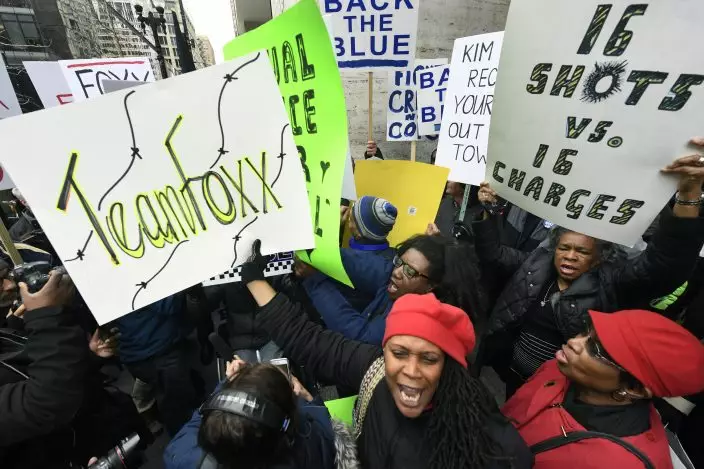
FILE - In this April 1, 2019, file photo, dueling protesters clash over Cook County State's Attorney Kim Foxx's office's decision to drop all charges against "Empire" actor Jussie Smollett in Chicago. Text messages released showed Foxx believed her office had overcharged “Empire” Smollett for allegedly staging a racist, anti-gay attack on himself drew heavy criticism because Foxx had recused herself from the case. (AP PhotoPaul Beaty, File)
The decision to dismiss the charges against Smollett may have followed Foxx's reform agenda, but it prompted an outburst of personal threats. Her chief of staff, Jennifer Ballard Croft, says the threatening messages came in the form of emails and calls, but declined to provide additional details about the specific nature of the threats.
Ballard Croft on Monday told the Chicago Sun-Times that in addition to threats to Foxx's personal safety, multiple threats "have contained racially-charged language."
Anger about the decision in March to drop all charges against Smollett could undermine Foxx's efforts to overhaul the nation's second-largest district attorney's office, which for decades has been seen as too aggressive and reliant on abusive police practices.
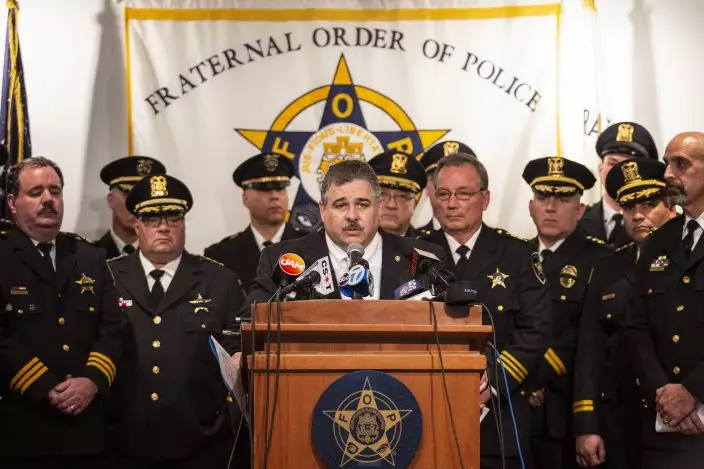
FILE - In this April 4, 2019, file photo, Chicago police union president Kevin Graham speaks during a press conference in Chicago, to announce a "no confidence" vote in the leadership of Cook County State's Attorney Kim Foxx. Graham called on Foxx to step down, saying the handling of the Smollett case just another example of her office letting off too lightly. (Ashlee RezinChicago Sun-Times via AP, File)
"It's given her a public credibility problem that still isn't resolved," said Dick Simpson, a political scientist at the University of Illinois at Chicago.
Foxx, who grew up in poverty in Chicago's notoriously crime-ridden Cabrini Green housing project, became the first black woman elected Cook County state's attorney in late 2016. Her victory on a reform platform was largely propelled by anger that the prosecutor she ousted had waited a year to charge a police officer in the fatal shooting of Laquan McDonald, a black teenager.
At Foxx's request, the county's inspector general is now reviewing her office's decision to drop charges against Smollett. Any revelations that she applied undue pressure on her staff could potentially damage her prospects of winning a second term, halting her reforms before they are fully adopted.
The clumsy handling of the case and questions about Foxx's intervention have also given fresh ammunition to those who have long opposed the agenda she laid out at the start of her term.
That program has included instructions to about 800 prosecutors she oversees to abandon past practices of always seeking the most serious possible charges and to be more discerning and nuanced in deciding when to charge someone with a felony. Potential employers, she explained in a February interview, rarely distinguish if the felony was for shoplifting or murder.
"The burden of the felony conviction is very real and onerous, even if it's for the lowest level of felony," Foxx told The Appeal podcast in February.
That thinking led to one of her most contentious reforms — a new policy of charging suspects accused of retail theft with a felony only if the value of items stolen exceeds $1,000, which is more than three times higher than the $300 threshold in previous years. She has said that the policy has enabled her office to shift more resources to gun crimes.
Another campaign pledge she helped fulfill was changing the cash-bond system to ensure suspects are not held behind bars solely because they are too poor to pay. Before that change in 2017, up to 300 people were jailed daily because they could not post bonds of $1,000 or less, contributing to overcrowding in the county jail.
She veered away, too, from policies that put people behind bars for driving on licenses suspended simply for failure to pay traffic tickets. The old policy, she explained, inordinately impacted the poor and essentially made prosecutors debt collectors.
Among her sharpest critics has been the Chicago police union president, Kevin Graham, who called on Foxx to step down earlier this month. He said the handling of the Smollett case was just another example of her office letting someone off too lightly.
"We need to have a prosecutor who is going to charge people when they commit a crime," he said.
With Foxx more vulnerable after the Smollett case, dozens of police chiefs from communities in Cook County but outside Chicago also stepped up attacks on reforms that they never liked in the first place.
They complain that that Foxx imposed changes with little consultation and provided often-muddled, contradictory guidance about who should and should not be arrested. Their biggest gripe is about decisions by prosecutors not to charge as many felonies and sometimes to avoid filing charges at all when it comes to nonviolent crimes, including for certain retail thefts and for possession of small amounts of marijuana.
"It appears your strategy to address non-violent crime in Cook County is to decriminalize or ignore it," Duane Mellema, president of the North Suburban Association of Chiefs of Police, wrote in a letter to Foxx earlier this month.
Reform advocates, among Foxx's most enthusiastic supporters, have stood by her.
"We feel good about her reforms overall," said Kristi Sanford, a spokeswoman for The People's Lobby, a Chicago-based activist group that lobbies for criminal justice reform. "She has a big job, because her predecessors were all about throwing the book at people."
Sanford dismisses the criticism of Foxx's reforms as "opportunistic" attacks by people who have consistently opposed changes for years. She said Foxx's handling of the Smollett case should not enter into calculations about her performance.
"It's a nonissue," Sanford said. "This is not a situation that leads us to question her commitment to reform."
Simpson said the Smollett case has been Foxx's highest-profile misstep since getting elected. But he doubted that her base of support among reformers and African-Americans was at risk. Whether her supporters abandon her before she seeks a second term will come down to whether she completes more of her reforms.
"If she can do that, I think she'll be fine," he said.
KYIV, Ukraine (AP) — A big, new package of U.S. military aid will help Ukraine avoid defeat in its war with Russia. Winning will still be a long slog.
The arms and ammunition in the $61 billion military aid package should enable Ukraine to slow the Russian army's bloody advances and block its strikes on troops and civilians. And it will buy Ukraine time — for long-term planning about how to take back the fifth of the country now under Russian control.
“Ultimately it offers Ukraine the prospect of staying in the war this year,” said Michael Clarke, visiting professor in war studies at King’s College London. “Sometimes in warfare you’ve just got to stay in it. You’ve just got to avoid being rolled over.”
The U.S. House of Representatives approved the package on Saturday after months of delays by some Republicans wary of U.S. involvement overseas. It was passed by the Senate on Tuesday, and President Joe Bidensigned it into law on Wednesday.
The difference could be felt within days on the front line in eastern and southern Ukraine, where Russia’s much larger army has been slowly taking territory against massively outgunned Ukrainian forces.
The aid approval means Ukraine may be able to release artillery ammunition from dwindling stocks that it has been rationing. More equipment will come soon from American stocks in Poland and Germany, and later from the U.S.
The first shipments are expected to arrive by the beginning of next week, said Davyd Arakhamia, a lawmaker with Ukrainian President Volodymyr Zelenskyy’s Servant of the People party.
But opposition lawmaker Vadym Ivchenko, a member of the Ukrainian parliament’s National Security, Defense and Intelligence Committee, said logistical challenges and bureaucracy could delay shipments to Ukraine by two to three months, and it would be even longer before they reach the front line.
While details of the shipments are classified, Ukraine’s most urgent needs are artillery shells to stop Russian troops from advancing, and anti-aircraft missiles to protect people and infrastructure from missiles, drones and bombs.
What’s coming first is not always what front-line commanders need most, said Arakhamia, the Ukrainian lawmaker. He said that even a military giant like the U.S. does not have stockpiles of everything.
“The logic behind this first package was, you (the U.S.) finds our top priorities and then you see what you have in the warehouses,” Arakhamia said. “And sometimes they do not match.”
Hope for future breakthroughs for Ukraine still hangs on more timely deliveries of Western aid, lawmakers acknowledge.
Many experts believe that both Ukraine and Russia are exhausted by two years of war and won’t be able to mount a major offensive — one capable of making big strategic gains — until next year.
Still, Russia is pushing forward at several points along the 1,000-kilometer (600-mile) front, using tanks, wave after wave of infantry troops and satellite-guided gliding bombs to pummel Ukrainian forces. Russia is also hitting power plants and pounding Ukraine’s second-largest city, Kharkiv, which is only about 30 kilometers (some 20 miles) from the Russian border.
Ivchenko said the goal for Ukraine’s forces now is to “hold the line” until the bulk of new supplies arrive by mid-summer. Then, they can focus on trying to recapture territory recently lost in the Donetsk region.
“And probably ... at the end of summer we’ll see some movement, offensive movement of the Ukrainian armed forces,” he said.
Some military experts doubt Ukraine has the resources to mount even small offensives very soon.
The U.S. funding “can probably only help stabilize the Ukrainian position for this year and begin preparations for operations in 2025,” said Matthew Savill, director of military sciences at the Royal United Services Institute, a think tank.
In the best-case scenario for Ukraine, the American aid will give commanders time to reorganize and train its army — applying lessons learned from its failed summer 2023 offensive. It may also galvanize Ukraine’s allies in Europe to increase aid.
“So this just wasn’t about Ukraine and the United States, this really affected our entire 51-country coalition,” said U.S. Congressman Bill Keating, a Democrat who visited Kyiv on Monday as part of a four-member congressional delegation.
Zelenskyy insists Ukraine's war aim is to recapture all its territory from Russia — including Crimea, seized illegally in 2014. Even if the war ultimately ends through negotiation, as many experts believe, Ukraine wants to do that from as strong a position as possible.
Whatever happens on the battlefield, Ukraine still faces variables beyond its control.
Former U.S. President Donald Trump, who seeks to retake the White House in the November election, has said he would end the war within days of taking office. And the 27-nation Europe Union includes leaders like Hungarian Prime Minister Viktor Orbán and Slovak Prime Minister Robert Fico, who have opposed arming Ukraine.
Ukraine’s allies have held back from supplying some arms out of concern about escalation or depleting their own stocks. Ukraine says that to win the war it needs longer-range missiles it could use for potentially game-changing operations such as cutting off occupied Crimea, where's Russia's Black Sea fleet is based.
Ukraine especially wants a longer-range version of Army Tactical Missile Systems, known as ATACMS, from the U.S., along with Taurus cruise missiles from Germany. Both governments have resisted calls to send them because they are capable of striking targets deep within Russian territory.
The new bill authorizes Biden to send Ukraine ATACMS that have a range of some 300 kilometers (190 miles) “as soon as practicable.”
On Wednesday, American officials revealed that the U.S. already secretly transferred a number of the longer-range missiles to Ukraine last month, and they were used for the first time last week to strike an airfield in occupied Crimea. The officials spoke on condition of anonymity to discuss the delivery before it became public.
Meanwhile, Russia is using its advantage in troops and weapons to push back Ukrainian forces, perhaps seeking to make maximum gains before Ukraine's new supplies arrive.
For weeks it has pummeled the small eastern city of Chasiv Yar, suffering heavy losses. Britain's Ministry of Defense says 900 Russian troops are being killed or injured a day in the war.
Capturing the strategically important hill town would allow them to move toward Sloviansk and Kramatorsk, key cities Ukraine controls in the eastern region of Donetsk. It would be a significant win for Russian President Vladimir Putin, who Western officials say is bent on toppling Ukraine’s pro-Western government.
Russian pressure was aimed not just at gaining territory, but on undermining Zelenskyy and bolstering critics who say his war plan is failing, said Clarke of King's College London.
The U.S. aid package decreases the likelihood of a political crisis in Ukraine, and U.S. Speaker Mike Johnson deserves credit for pushing it through Congress, he said.
"He held history in his hands,” Clarke said.
This story has been updated to correct Orbán's title, the Slovak prime minister's name and that the British estimate of daily Russian losses is for the war, not one battle.
Associated Press writers Lolita C. Baldor and Tara Copp contributed from Washgington.
Follow AP’s coverage of the war in Ukraine at https://apnews.com/hub/russia-ukraine

From left, U.S. representatives Nathaniel Moran, R-Tx, Tom Kean Jr, R-NJ, Bill Keating, D-Mass, and Madeleine Deane, D-Pa, talk to journalists during a joint news conference outside Saint Michael cathedral in Kyiv, Ukraine, Monday, April 22, 2024. A newly approved package of $61 billion in U.S. aid may prevent Ukraine from losing its war against Russia. But winning it will be a long slog. (AP Photo/Francisco Seco)
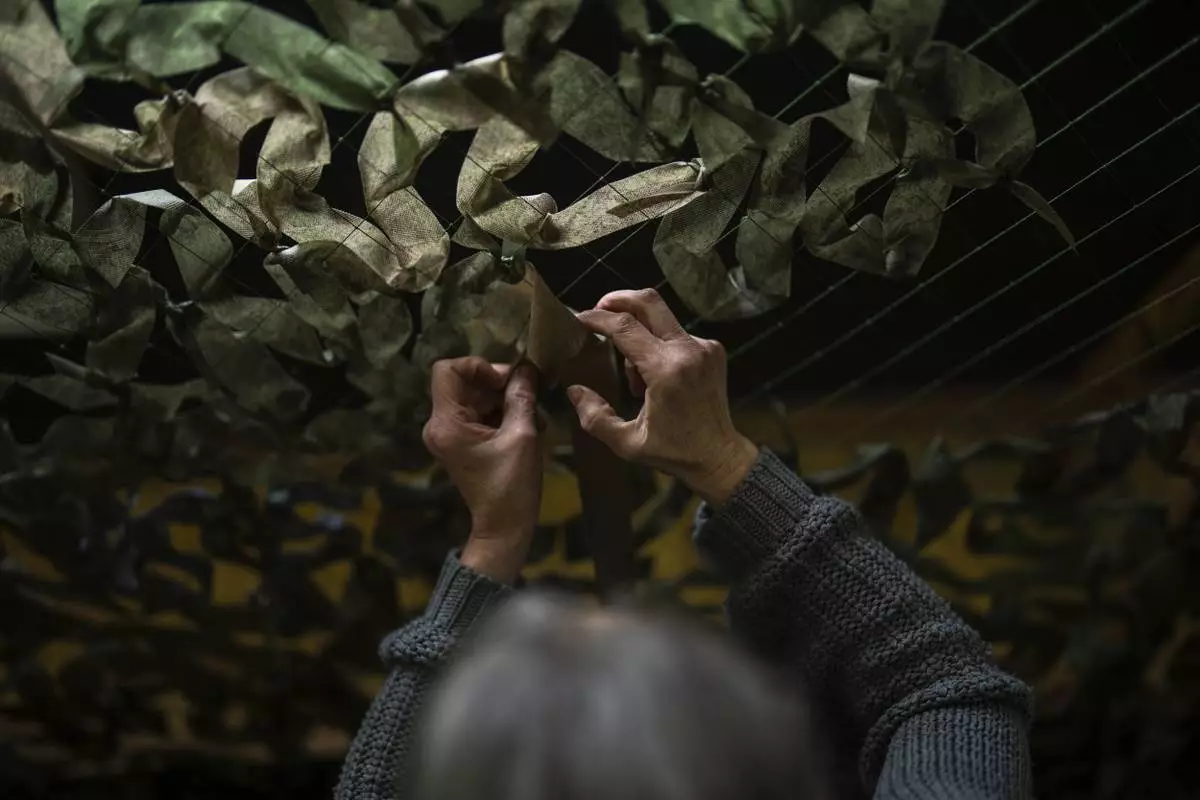
A volunteer makes a camouflage net at a facility producing material for Ukrainian soldiers in Kyiv, Ukraine, Monday, April 22, 2024. A newly approved package of $61 billion in U.S. aid may prevent Ukraine from losing its war against Russia. But winning it will be a long slog. (AP Photo/Francisco Seco)
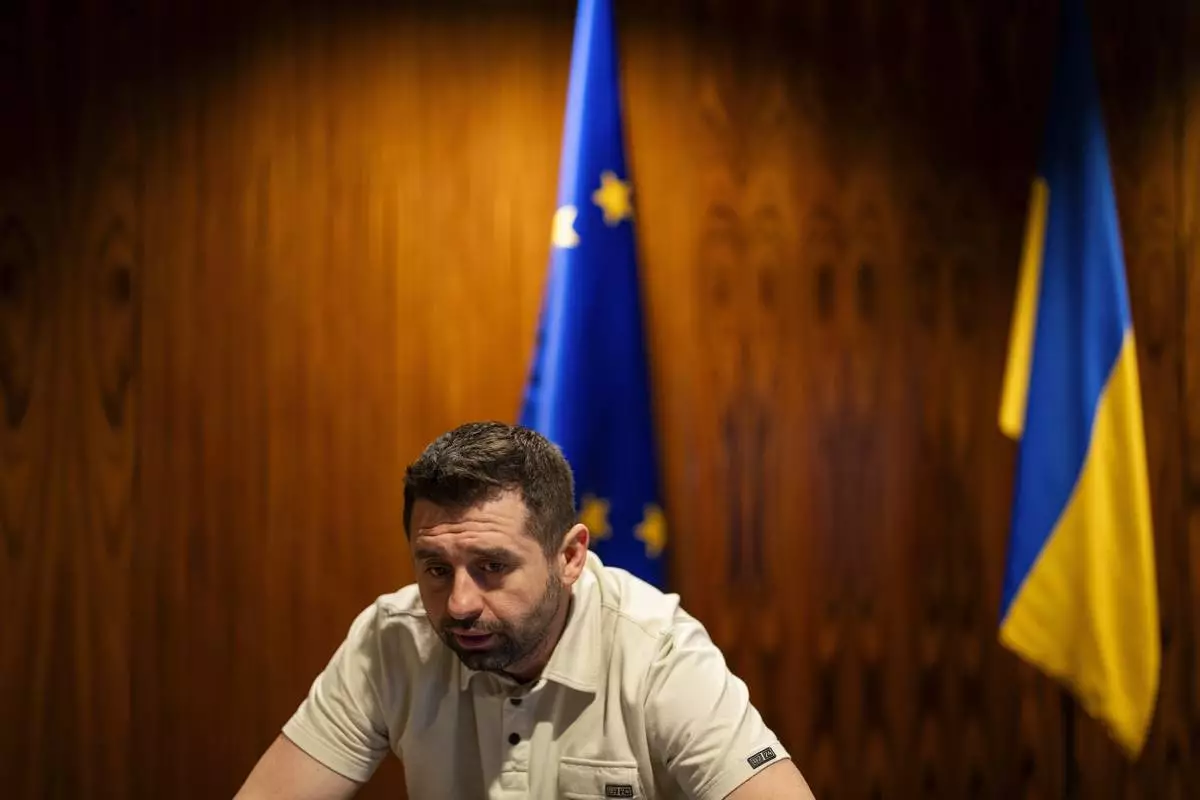
Davyd Arakhamia, a lawmaker with Ukrainian President Volodymyr Zelenskyy's Servant of the People party, talks during an interview with Associated Press in Kyiv, Ukraine, Monday, April 22, 2024. (AP Photo/Francisco Seco)
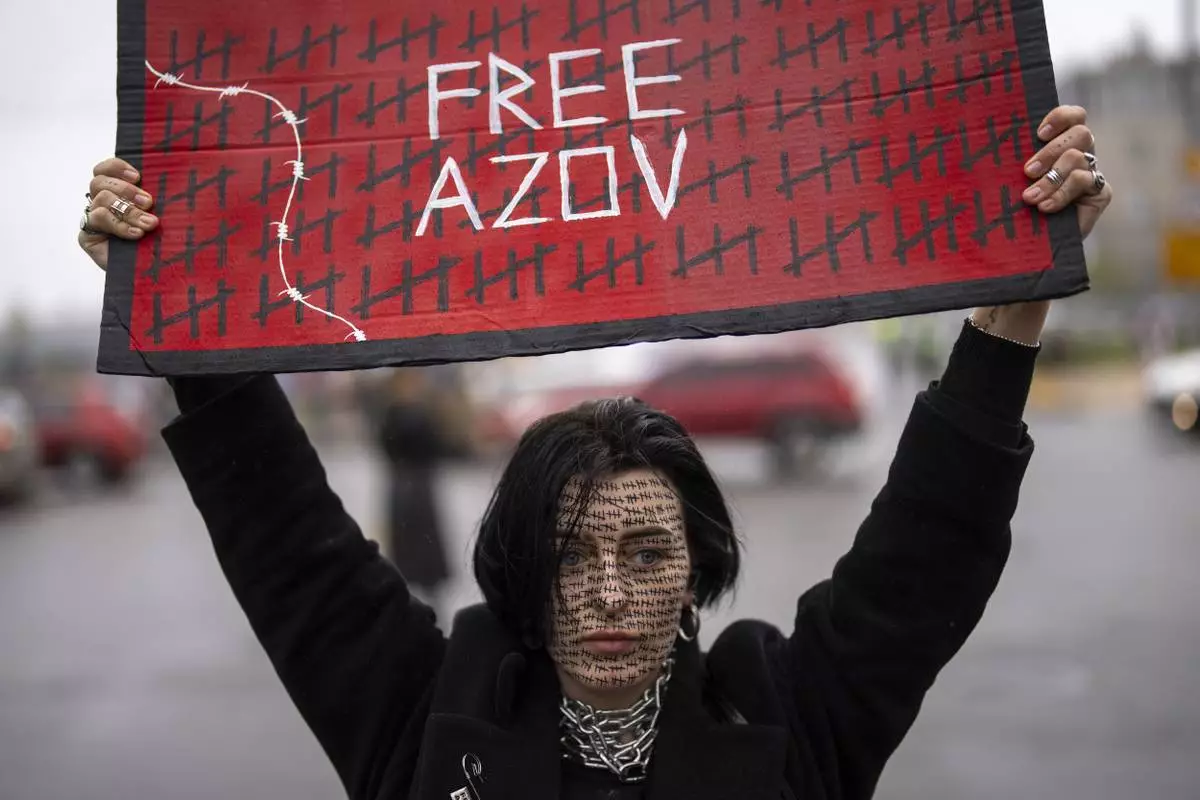
A woman rallies to raise awareness on the fate of Ukrainian prisoners of war in Kyiv, Ukraine, Sunday, April 21, 2024. (AP Photo/Francisco Seco)
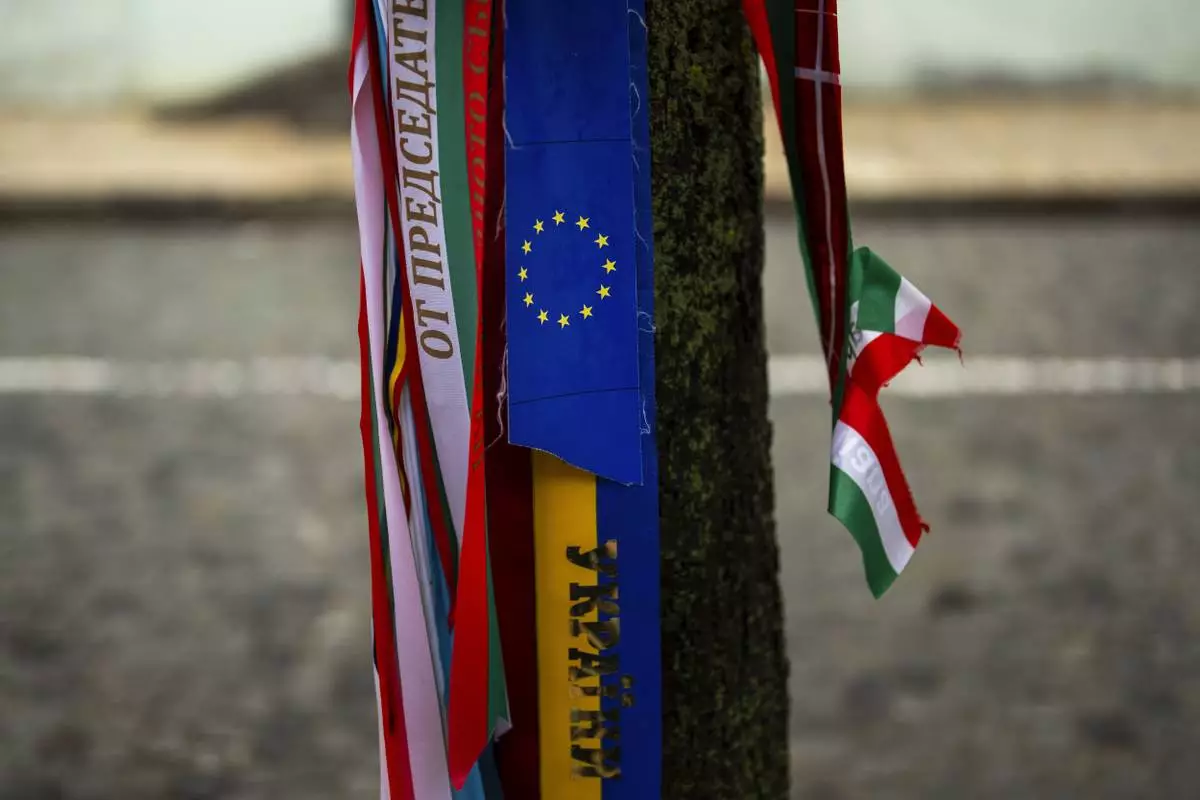
Ribbons with the colors of the European Union and Ukraine are attached to a tree next to memorial wall of Ukrainian soldiers killed during the war in Kyiv, Ukraine, Monday, April 22, 2024. (AP Photo/Francisco Seco)
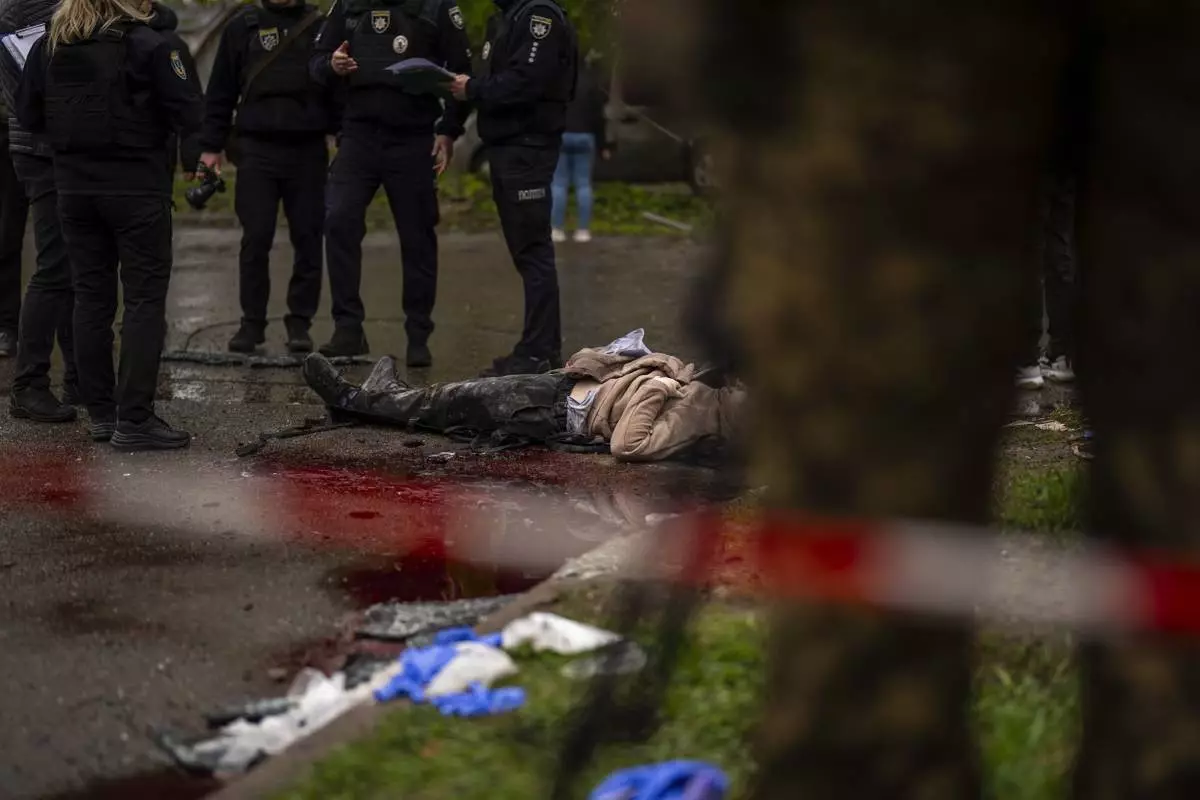
The body of a woman killed by Russian bombardment in Chernihiv, Ukraine, Wednesday, April 17, 2024. (AP Photo/Francisco Seco)

Soldiers carry the coffins of two Ukrainian army sergeants during their funeral in Lviv, Ukraine, Tuesday, April 16, 2024. (AP Photo/Francisco Seco)


















